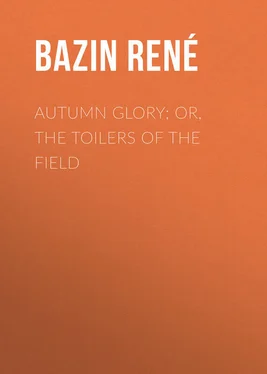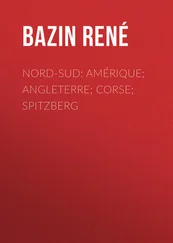René Bazin - Autumn Glory; Or, The Toilers of the Field
Здесь есть возможность читать онлайн «René Bazin - Autumn Glory; Or, The Toilers of the Field» — ознакомительный отрывок электронной книги совершенно бесплатно, а после прочтения отрывка купить полную версию. В некоторых случаях можно слушать аудио, скачать через торрент в формате fb2 и присутствует краткое содержание. Жанр: foreign_language, foreign_antique, foreign_prose, на английском языке. Описание произведения, (предисловие) а так же отзывы посетителей доступны на портале библиотеки ЛибКат.
- Название:Autumn Glory; Or, The Toilers of the Field
- Автор:
- Жанр:
- Год:неизвестен
- ISBN:нет данных
- Рейтинг книги:3 / 5. Голосов: 1
-
Избранное:Добавить в избранное
- Отзывы:
-
Ваша оценка:
- 60
- 1
- 2
- 3
- 4
- 5
Autumn Glory; Or, The Toilers of the Field: краткое содержание, описание и аннотация
Предлагаем к чтению аннотацию, описание, краткое содержание или предисловие (зависит от того, что написал сам автор книги «Autumn Glory; Or, The Toilers of the Field»). Если вы не нашли необходимую информацию о книге — напишите в комментариях, мы постараемся отыскать её.
Autumn Glory; Or, The Toilers of the Field — читать онлайн ознакомительный отрывок
Ниже представлен текст книги, разбитый по страницам. Система сохранения места последней прочитанной страницы, позволяет с удобством читать онлайн бесплатно книгу «Autumn Glory; Or, The Toilers of the Field», без необходимости каждый раз заново искать на чём Вы остановились. Поставьте закладку, и сможете в любой момент перейти на страницу, на которой закончили чтение.
Интервал:
Закладка:
Rousille rejoiced in it. She loved her native soil, faithful, true, generous soil, ever yielding its increase whether in rain or sunshine; where one would sleep one's last sleep to the sighing of the wind, under the shelter of the Cross. She loved nothing better than that horizon where every tiniest road was familiar to her, from the fence that ran along the first meadow of La Fromentière close at hand, to the paths on the embankment which must be traversed pole in hand to jump the dykes.
"Four o'clock," she said to herself, "and he has not come back yet! What will father say?" She was beginning to grow uneasy, when, as she was gazing into the distance towards the pointed clock tower of Sallertaine, a voice startled her with:
"Rousille!" On the rising path, the marshland behind him, standing looking at her in the light of the early morning, was Jean Nesmy.
"I did not see you come," she said.
He laughed, and with a proud air raised above his head a bundle of feathers, four plovers and a teal tied together. The next moment, resting the gun he carried against the inside of the wall, and flinging over the birds, he dropped down beside Rousille.
"Rousille," he said, taking her hand under the arching apple-trees, "I have had luck! Four plovers and such fine ones! I had a couple of hours' sleep in the barn at La Pinçonnière, and if the farmer had not dragged me out this morning, I should have been late, I was so sound asleep. And you?"
"I," replied Marie-Rose, as he sat opposite to her, "I am afraid. Father spoke to me so angrily last night – he had been talking to Mathurin in the courtyard – they must know."
"Well, and if they do? I am doing nothing to anger them. I mean to win you by my work, to ask your father for your hand, and take you home as my wife."
She looked at him, happy, despite her fears, at the determination she read in the lad's face. And reserving her thought which answered yes, she said without direct reply:
"What is it like in your home?"
"In my home," replied Jean Nesmy, contracting his eyes as if to fix the picture thus evoked, and looking over Rousille's head – "in my home is my mother, who is old and poor. The house she lives in is called the Château, as I have told you before, in the parish of Châtelliers; but it is not by any means a castle, Rousille, only two rooms, in which live six little Nesmys besides myself, who am the eldest … it was, as you know, on account of our poverty and the number of children that I could only serve one year in the army."
"Oh, yes, I remember," she answered, laughing, "that year seemed to me longer than any other."
"I am the eldest; then come two girls, who are growing up. They are not dressed altogether like you, for instance…"
An idea seized him, and with his hand quite near yet without touching Rousille, he sketched about the young girl's shoulders and waist, the little shawl and the long velvet ribbons encircling the bust. "All round there two rows of velvet; rich girls have even three. You would be charming, Rousille, in the costume of the Châtelliers and La Flocellière, for they dress in the same manner, the villages are quite close."
She laughed, as if caressed by the hand which never touched her, following its action with half-closed eyes.
"As you may suppose," he continued, "they only dress like that on Sundays! There would not be bread in the house every day if I did not send home the wages that your father gives me. Then I have two brothers who have finished their schooling, and look after cows and begin to do little odd jobs. The farmer who hires them gives them each one row of potatoes to dig up for their own. It is a great help!"
"So I should think!" returned Rousille, with an air of conviction
"But above all," continued the lad, "our air is superb. We have plenty of rain, indeed it rains without ceasing when the wind blows from Saint Michael, a place about one league from us. But immediately after we are in full sunshine; and as we have plenty of trees and moss and ferns about us, the air is a very joy to breathe, quite different from here; for our country is not at all like that of the Marais; it is all hills, here, there, and everywhere, big and little; there is no getting away from them. From any height it looks a perfect paradise. Ah, Rousille, if you only knew Le Bocage, and the moors of Nouzillac, you would never want to leave them!"
"And is the land tilled like this?"
"Very nearly, but much deeper. It takes strong oxen, sometimes six or eight to plough."
"Father uses as many, when it pleases him."
"Yes, for the honour of it, Rousille, because your father is a rich man. But down there, believe me, the soil has more granite and is harder to turn."
She hesitated a little, the smile left her face as she asked:
"Do the women work in the fields?"
"Oh, no, of course not," answered the lad warmly. "We respect and care for them as much as men do here in your Marais. Even my mother, who goes gleaning at harvest-time and when the chestnuts are gathered, is never seen working in the fields like a man. No, you may depend on it, our women are more indoors spinning, than doing out-of-door work."
Recalled to the stern conditions of his daily life, the young man grew grave, and added slowly:
"Rest assured, I will never slacken in my work. I am known for more than two leagues round Châtelliers as a lad who has no fear of hard work. We will have our own little house to ourselves, and if only I have your love, Rousille, like my father and mother, I will never complain of any hardships."
He had scarcely ended his speech of humble love-making when a voice from the road called:
"Rousille!"
"We are betrayed!" she said, turning pale. "It is father."
They both remained motionless, with beating hearts, thinking only of the voice that would call again.
And, in truth, it was now heard nearer.
"Rousille!"
She did not resist. Signing to Jean Nesmy to remain under cover of the trees, and bending half double, she made her way out to the path that divided the orchard. There straightening herself, she saw her father standing before her in the road. He looked at his daughter for a moment, as she presented herself, pale, breathless, dishevelled by the branches, then said:
"What were you doing there?"
She would not lie; she felt herself lost. In her trouble involuntarily she turned her head as if to invoke the protection of him in hiding, and there just behind, erect, quite close to her, Rousille saw her lover, who had come to her aid in the moment of danger. With an air of defiance he drew himself up, and strode in front of her. Then the girl ventured to look again at her father. He was no longer occupied with her, nor had he the angry aspect she expected to see; his expression was grave and sad, and he looked steadily at Jean Nesmy, who, pressing forward on the grassy walk, had stopped at the opening, within three feet of him:
"You here, my farm-servant!" he said.
Jean Nesmy made answer:
"Yes, I am here."
"You have been with Rousille, then?"
"And what is the harm?" inquired the lad, with a slight tremor, which he could not control, not of fear, but of the hot blood of youth.
There was no anger in the farmer's voice. With head bent on his breast, as of a master whose kindness has been abused, and who is sorrowing, he said with a sigh:
"Come you here, at once, with me."
Not a word to Marie-Rose, not one look. It was a matter to be settled among men first; the daughter did not count at present.
The farmer was already retracing his steps, walking with leisurely stride towards La Fromentière; Jean Nesmy followed at a short distance, his gun slung on his back, swinging the birds he had shot in one hand. Far behind them came Rousille in sore distress, sometimes looking at Jean Nesmy, sometimes at the master who was to decide his fate.
Читать дальшеИнтервал:
Закладка:
Похожие книги на «Autumn Glory; Or, The Toilers of the Field»
Представляем Вашему вниманию похожие книги на «Autumn Glory; Or, The Toilers of the Field» списком для выбора. Мы отобрали схожую по названию и смыслу литературу в надежде предоставить читателям больше вариантов отыскать новые, интересные, ещё непрочитанные произведения.
Обсуждение, отзывы о книге «Autumn Glory; Or, The Toilers of the Field» и просто собственные мнения читателей. Оставьте ваши комментарии, напишите, что Вы думаете о произведении, его смысле или главных героях. Укажите что конкретно понравилось, а что нет, и почему Вы так считаете.












